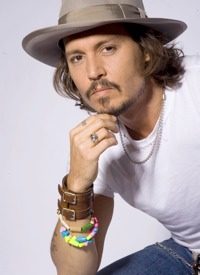
Depp will play Tonto, but hopefully not as he plays Sparrow, whose mannerisms are, as Depp admits, foppishly homosexual.
The Disney version of The Lone Ranger, to be directed by Gore Verbinski, will be an updated, politically correct version of the Western tale, which began as a radio program in the 1930s. Verbinski directed the first three installments of the wildly popular Pirates of the Caribbean.
Depp and Verbinski are convinced the venerable if hokey tale of the American West is simply out of date, and that Tonto didn't get the billing or authority he deserved.
Depp's Concerns
Depp told Entertainment Weekly he began having reservations about the program when he was kid. Somehow, he had the sneaking suspicion that something wasn't right with the Masked Man's stoic but faithful Indian companion.
Said Depp, who often looks like he spent some time with Chief Broom at the state mental asylum:
“I remember watching it as a kid, with Jay Silverheels and Clayton Moore, and going: ‘Why is the f—ing Lone Ranger telling Tonto what to do?’” Depp tells EW, recalling the 1949-1957 TV show, which was seen decades longer in reruns. “I liked Tonto, even at that tender age, and knew Tonto was getting the unpleasant end of the stick here. That’s stuck with me. And when the idea came up [for the movie], I started thinking about Tonto and what could be done in my own small way try to — ‘eliminate’ isn’t possible — but reinvent the relationship, to attempt to take some of the ugliness thrown on the Native Americans, not only in The Lone Ranger, but the way Indians were treated throughout [the] history of cinema, and turn it on its head.”
The star of Edward Scissorhands and Donnie Brasco also said he has finally divined what ruffled the fringe on his buckskins. Depp believes he descends from a long line of Indians, who are, he thinks, naturally violent and aggressive. The mean streak was passed down to Depp, which started him pounding the war drums about Tonto.
Tonto’s treatment especially bugged him because Depp had always been told his family was part Indian. “I guess I have some Native American somewhere down the line,” he says. “My great grandmother was quite a bit of Native American, she grew up Cherokee or maybe Creek Indian. Makes sense in terms of coming from Kentucky, which is rife with Cherokee and Creek.”
Depp is proud of that heritage, though it haunts him a little too. He imagines that at some point, his ancestors were subjected to horrifying violence, and the family offspring who came from those early couplings may not have occurred through consent.
“The interesting thing,” he notes, “if you find out you’ve got Native American blood, which a lot of people do, is you think about where it comes from and go back and read the great books, Dee Brown’s Bury My Heart At Wounded Knee or [John Ehle's] Trail of Tears, you have to think, somewhere along the line, I’m the product of some horrific rape. You just have that little sliver in your chemical makeup.”
The Lone Ranger's Code
Whatever Depp's chemical make-up when he says things such as this, or what he thinks he knows about his ancestors and what Tonto must have felt, the original story hardly has the Lone Ranger mistreating his Indian friend. Indeed, the tale begins with Tonto saving his Kemosabe (trusty scout), known as Texas Ranger John Reid before taking up with Tonto, after an ambush by the nefarious highwaymen of the Cavendish gang. Reid was last the Ranger left alive and thus became The Lone Ranger.
From there, on a fiery horse with the speed of light in a cloud of dust, he and Tonto dispatched villains across the West. The Lone Ranger's writer, Fran Striker, conceived the Ranger Code for the little boys and girls listening on the radio and glued to the television. It says:
I believe that to have a friend,
a man must be one.
That all men are created equal
and that everyone has within himself
the power to make this a better world.
That God put the firewood there
but that every man
must gather and light it himself.
In being prepared
physically, mentally, and morally
to fight when necessary
for that which is right.
That a man should make the most
of what equipment he has.
That "This government,
of the people, by the people
and for the people"
shall live always.
That men should live by
the rule of what is best
for the greatest number.
That sooner or later …
somewhere … somehow …
we must settle with the world
and make payment for what we have taken.
That all things change but truth,
and that truth alone, lives on forever.
In my Creator, my country, my fellow man.
Verbinski Agrees with Depp
That undoubtedly sounds subversive to the Hollywood crowd, even if it contains some liberal hooey, but in any event Verbinski is as determined as Depp to turn the story upside down and put Tonto in charge of what always seemed like a partnership of two men who need each other to outwit the bad guys. Agreeing with Depp, Verbinski says he wouldn't think of doing the film without reversing roles to put the red man in charge of the white: “The only version of ‘The Lone Ranger’ I’m interested in doing is ‘Don Quixote’ told from Sancho Panza’s point of view,” Verbinski told the Los Angeles Times. “And hence I was honest early on with Johnny that Tonto is the part. We’re not going to do it [straight], everyone knows that story. I don’t want to tell that story.”
Except that story is the story, not the one Verbinski wants to tell. Striker went to the Happy Hunting Ground in 1962, so we don't what he thinks, although given Depp's distinguished tribal lineage, he might consult a medicine man to find out.
Depp's next outing as the popinjay Sparrow, Pirates of the Caribbean: On Stranger Tides, opens in theaters on May 20.
Photo of Johnny Depp: AP Images



